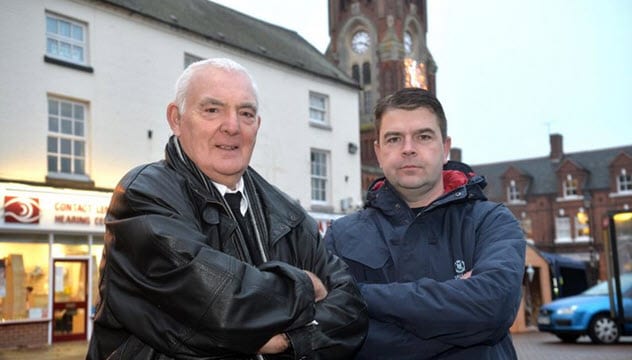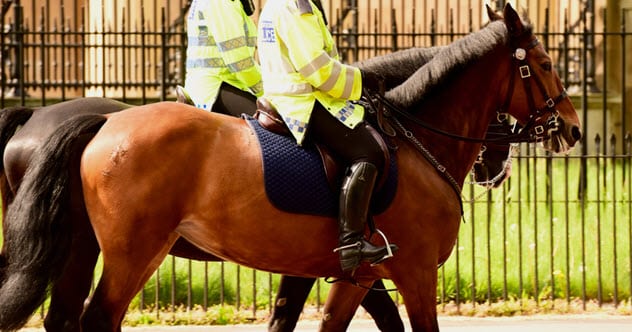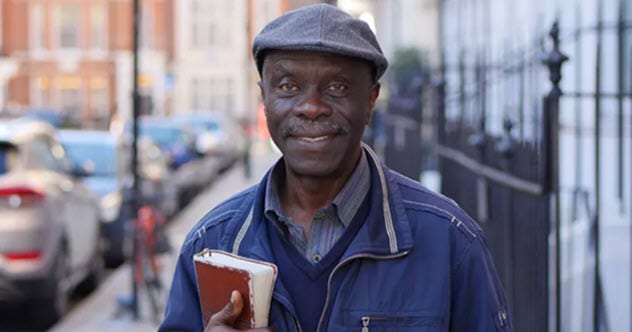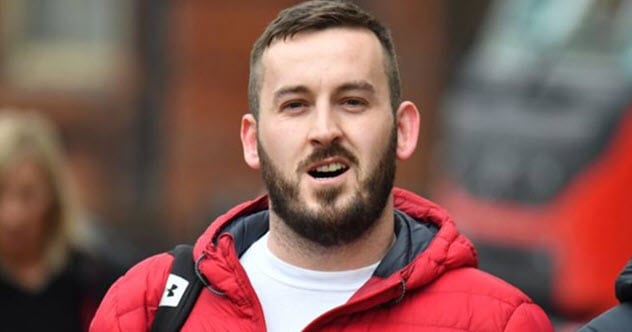 Miscellaneous
Miscellaneous  Miscellaneous
Miscellaneous  Our World
Our World 10 Green Practices That Actually Make a Difference
 Humans
Humans Ten Historic Men Who Deserve Way More Credit Than They Got
 Movies and TV
Movies and TV The 10 Most Heartwarming Moments in Pixar Films
 Travel
Travel Top 10 Religious Architectural Marvels
 Creepy
Creepy 10 Haunted Places in Alabama
 History
History Top 10 Tragic Facts about England’s 9 Days Queen
 Food
Food 10 Weird Foods Inspired by Your Favorite Movies
 Religion
Religion 10 Mind-Blowing Claims and Messages Hidden in the Bible Code
 Facts
Facts 10 Things You Never Knew about the History of Gambling
 Miscellaneous
Miscellaneous Ten Groundbreaking Tattoos with Fascinating Backstories
 Our World
Our World 10 Green Practices That Actually Make a Difference
 Humans
Humans Ten Historic Men Who Deserve Way More Credit Than They Got
Who's Behind Listverse?

Jamie Frater
Head Editor
Jamie founded Listverse due to an insatiable desire to share fascinating, obscure, and bizarre facts. He has been a guest speaker on numerous national radio and television stations and is a five time published author.
More About Us Movies and TV
Movies and TV The 10 Most Heartwarming Moments in Pixar Films
 Travel
Travel Top 10 Religious Architectural Marvels
 Creepy
Creepy 10 Haunted Places in Alabama
 History
History Top 10 Tragic Facts about England’s 9 Days Queen
 Food
Food 10 Weird Foods Inspired by Your Favorite Movies
 Religion
Religion 10 Mind-Blowing Claims and Messages Hidden in the Bible Code
 Facts
Facts 10 Things You Never Knew about the History of Gambling
10 Times British Cops Said ‘No’ To Free Speech
Britain’s free speech problems are becoming increasingly familiar to those paying attention. The authorities have decreed that certain words and expressions are not only unpleasant but criminal. Plenty of “hate crimes” are punishable under British law, from singing sectarian football songs to teaching a pug how to perform the Nazi Sieg Heil.
The bar for investigating outspoken citizens is now dangerously low. In 2016 alone, the British cops quizzed over 3,000 people for posting “offensive” remarks online. The London mayor has introduced the Online Hate Crime Hub, set to cost around $2 million for two years’ worth of service. And misogynistic acts, including “whistling” and “sexually explicit language,” are set to become hate crimes. This is merely the tip of the iceberg.
In 2018, South Yorkshire Police instructed the public to “report non-crime hate incidents, which can include things like offensive or insulting comments, online, in person, or in writing.” The region’s Police and Crime Commissioner said this stance was “nationally accepted good practice.”
The concept of free speech erodes with each passing year as it is battered and besieged by those with strong ideological beliefs. In the ceaseless war on words, the police are happy to curtail various forms of expression. Jokes, ditties, songs, opinions—nothing is beyond censorship in Britain. And it is all in the name of preventing public disorder and offense.
Here, we take a look at just 10 times the British cops said “no” to freedom of speech.
10 Mandela Joke

In 2013, Nelson Mandela became critically ill. The world watched as the anti-apartheid icon was placed on life support. He would later die of a respiratory infection while surrounded by his loving family. Mandela was a hero to many. But that did not stop others from mocking the nature of the man’s death.
At the height of Mandela’s illness, a British man joked, “My PC takes so long to shut down I’ve decided to call it Nelson Mandela.” He also posted, “Free Mandela—switch the power off.”
A Staffordshire county councilor took exception to the remark and lodged a formal complaint. That was sufficient for the British police to act. They descended upon the man’s home and arrested him. He was taken to a police station and interviewed over a period of eight hours.
The arrestee, Neil Phillips, spoke of his experience: “I was fingerprinted, they took DNA and my computer.” He added, “What happened to freedom of speech?”[1]
As it turned out, there was an ongoing feud between Mr. Phillips and the councilor over a memorial tribute. The town planned to erect a statue of three miners to celebrate its mining heritage.
But a bitter dispute erupted over the tribute’s proposed location. The council wanted the statue in the town center, but many residents, including Phillips, wanted it elsewhere. The council complained that the plans had been hijacked by extremists and members of the “far right.”
The Crown Prosecution Service decided there was not enough evidence to launch a criminal prosecution. The accused discovered this fact upon answering his bail.
9 Burning An Effigy Of A Tower Block

In 2017, an enormous fire engulfed a residential tower block at the heart of Britain’s capital. A faulty fridge freezer situated on the fourth floor of Grenfell Tower triggered the fire. The blaze quickly spread along the building’s exterior cladding as occupants poured into the streets. Others were not so lucky. Despite the best efforts of on-duty firefighters, 72 residents were burned alive.
So it came as quite the shock when a video mocking the incident surfaced online. The footage showed a group of partygoers celebrating Guy Fawkes Night. The annual event is named after one of the ringleaders of the 17th-century plot to blow up the Houses of Parliament. Brits typically celebrate the occasion by lighting fireworks and burning effigies of Guy Fawkes.
However, on this occasion, the revelers decided to burn a model of Grenfell Tower. The windows were even adorned with paper cutouts of tenants. As the model went up in flames, onlookers voiced the paper tenants. “Help me, help me,” cried one of the bystanders.
The video made national headlines, and Prime Minister Theresa May branded the incident “utterly unacceptable.” Six men handed themselves over to the police. The cops proceeded to search the southeast London property where the video was recorded, spending two hours looking for evidence.
Paul Bussetti, the man accused of filming and uploading the video, was charged under the Communications Act 2003. Specifically, he is charged with sharing footage of a “menacing character” on WhatsApp and causing another person to share it on YouTube. The other five men remain under police investigation.[2]
8 Singing ‘Kung Fu Fighting’

In 2011, Simon Ledger was innocently singing some classic tunes at the Driftwood Beach Bar on the Isle of Wight. Alas, one passerby was not impressed by his choice of song.
Upon hearing Ledger’s rendition of “Kung Fu Fighting,” a gentleman of Chinese heritage took offense. In a fit of rage, the man made a series of rude gestures before disappearing into the night. He then contacted the police and claimed that he had experienced “racial abuse.”
Hampshire Police wasted no time. Ledger was arrested within mere hours of the incident taking place. The dazed and confused man handed himself over to the police, who accused him of causing “harassment, alarm, or distress.” Ledger was initially released on bail pending further investigation, but the charges were eventually dropped due to lack of evidence.
“Kung Fu Fighting” was originally performed by legendary singer Carl Douglas. Suffice it to say, Douglas had something to say about the whole affair. “I couldn’t believe it,” stated the Jamaican-born singer. “This is not a racist song. It’s a happy, kicking, disco song.”
The British bobbies were having none of it, though. “We will treat such allegations seriously to provide reassurance for victims and to protect the integrity of appropriate lines of inquiry,” explained a police spokesperson.[3]
7 The Bin Laden Song

The quiet village of Cherry Hinton in Cambridgeshire is not known for its criminal masterminds. Illegal dumping of trash and five-finger discounts are about the only issues occupying the minds of locals.
But in May 2017, the village was home to a raucous garden party. Several members of the public reported hearing loud music and anti-Islamic abuse, so a lone police officer was dispatched to confront the alleged perpetrators.
But the incident quickly escalated. Upon hearing a song denigrating Osama bin Laden, the officer pressed her panic button. A police helicopter was dispatched to the scene along with a squad of 10 officers.
The officers seized a karaoke machine and a mobile phone. According to one of the people at the party, the offending song was automatically played through YouTube’s shuffle feature. When officers questioned the party, one man remonstrated: “We didn’t put it on on purpose. It wasn’t premeditated.”[4]
The Lonely Island produced “Finest Girl (Bin Laden Song),” the parody song in question. It features the following off-color lyrics: “Finest girl I ever met in my whole life. Wanna take her home, make her my wife. Knew she was a freak when she started talking. She said, ‘F—k me like we f—ked bin Laden.’ ”
The video has been viewed over 26 million times on YouTube.
6 Discussing A Horse’s Sexuality

Sam Brown was enjoying a boozy night out in Oxford when he ran into a spot of bother with the local police. Celebrating the completion of his final-year English Literature exams, the Oxford University student asked a mounted police officer, “Excuse me, do you realize your horse is gay?” The inebriated rapscallion persisted: “Your horse is gay.”[5]
Not seeing the joke, the police officer called for backup. Two squad cars arrived, and the 21-year-old was arrested on suspicion of causing harassment, alarm, or distress. He spent the night in the police cells and was ordered to pay an £80 fixed penalty notice.
When Sam refused to pay the fine, the police attempted to take him to court. The Crown Prosecution Service (CPS) dropped the case, citing insufficient evidence.
However, the police were adamant that they had done nothing wrong. “We present the case to the CPS, and the CPS make the decision to proceed or not,” explained a Thames Valley Police spokesperson. “He made homophobic comments that were deemed offensive to people passing by.”
A similar incident occurred in 2007 when teenager Kyle Little barked at two Labradors in Newcastle, England. Although the owner submitted no complaint, the police considered the incident a criminal offense.
Little was arrested for engaging in “threatening, abusive or insulting words or behavior, or disorderly behavior.” He was initially convicted and ordered to pay a fine of £50.
Upon appeal, Newcastle Crown Court overturned the bizarre conviction. Understandably, the judge was not impressed: “I’m sure an expert in Labradors would no doubt explain how distressed the dog was, but I don’t think section five of the Public Order Act applies to dogs.”
The proceedings cost the British taxpayer around $10,000.
5 Making Airplane Gestures

In January 2019, a light aircraft carrying soccer star Emiliano Sala disappeared. Following a series of intense search and rescue efforts, the wreckage of the plane was discovered along the English Channel. Sala’s body was soon recovered. The coroner confirmed that the Argentinian had died from injuries to the head and trunk.
Most people responded to this tragedy in a responsible and sensitive manner. But two Southampton soccer fans went in a different direction. Before his untimely demise, Sala had been transferred to Cardiff City Football Club for around $19 million.
When Cardiff City played against Southampton, the two teams held a moment of silence to commemorate their fallen colleague. During the match, two Southampton fans were seen making airplane gestures, seemingly mocking Sala’s death.
The stewards removed the pair from the stadium and handed them over to the local police. Officers detained the two fans and took their details.
“Sad to say more than one arrest today of [Southampton] fans for appalling gestures towards Cardiff fans, we will be working closely with Southampton to prevent this behavior at football,” tweeted Hampshire Police Football United.[6]
A similar incident took place during a match between Crystal Palace and Manchester United. In March 2019, a Crystal Palace fan allegedly used airplane gestures to mock the Munich air disaster. The tragic plane crash, which took place in 1958, resulted in the deaths of eight Manchester United players. The cops have vowed to hunt down the soccer fan.
4 Liking A Transgender Limerick

In January 2019, a small business owner landed himself in hot water after liking a transgender limerick on Twitter that some may find offensive. It is worth noting that Harry Miller, the Twitter maverick, did not even write these words himself. He merely clicked the little heart icon—or “like” button—beneath another user’s post.
Nonetheless, the cops told Mr. Miller, a former police officer, that they needed to “check his thinking.” An officer from Humberside Police in northeast England opened up an investigation into the incident. Curiously, Miller did not even live in Humberside.
The police officer collected 30 tweets from Miller’s account. “I asked if any contained criminal material,” explained the 53-year-old. “He said . . . no. I asked if any came close to being criminal . . . and he read me a limerick. Honestly. A limerick. A cop read me a limerick over the phone. I said, I didn’t write that. He said, ‘Ah. But you Liked it and promoted it.’ ”[7]
Miller was told to be more careful on social media. While the tweets were not of a criminal nature, the officer cautioned that they could get Miller fired from his place of work. Evidently, the officer had not quite worked out that Miller ran his own company and was unlikely to fire himself.
In March 2019, journalist Caroline Farrow was accused of “misgendering” a transgender teenager on Twitter. Farrow also allegedly accused the teen’s mother of “child abuse” and “castrating” her own child. Surrey Police instructed the 44-year-old to attend a police interview under caution or risk arrest. The complaint was later withdrawn.
3 Street Preaching

After moving to Britain around nine years ago, Oluwole Ilesanmi started preaching in various towns and cities across the country. In February 2019, the 64-year-old Nigerian was preaching in London when a passerby took offense. The man confronted Ilesanmi for calling Islam an “aberration.”
The Metropolitan Police Service was quick to act. “What are you doing here?” asked one officer.
“I am preaching,” Ilesanmi responded.
“I am gonna require you to go away.”
Ilesanmi stood his ground and refused to leave. But the police threatened to arrest the religious man for breaching the peace. “You are causing problems. You are disturbing people’s days, and you are breaching their peace,” argued one officer.
When Ilesanmi mentioned Jesus, the officer replied, “Nobody wants to listen to that. They want you to go away.” As the conversation unfolded, an exasperated Ilesanmi said, “You will listen when you are dead.”
Ilesanmi was handcuffed and placed in the back of a police vehicle. He was then transported to a new location over 5 kilometers (3 mi) from where the initial incident took place.
The two officers released the cuffs, ejected their detainee from the car, and drove away. The preacher was stranded with no money. After learning of Ilesanmi’s plight, a kind stranger offered to pay for his bus ticket home.
The Mayor of London Sadiq Khan later confirmed that a concerned citizen had contacted the police because of Ilesanmi’s language. “In this case, the officers took a decision to detain the preacher in order to prevent a breach of the peace,” stated the mayor. “He was taken away from the area and subsequently de-arrested.”[8]
2 Calling A Politician A Nazi

The United Kingdom’s decision to leave the European Union (EU) has caused some political kerfuffle. Three years after the referendum result, the island nation remains tethered to the EU. Politicians are now strongly divided between the endlessly warring “Leave” and “Remain” camps. And parliament faces an angry backlash from vocal elements of a disillusioned electorate.
A number of Remain politicians, including former Conservative MP Anna Soubry, have called for a second referendum on the UK’s membership in the EU. In January 2019, the MP for Broxtowe, Nottinghamshire, reiterated this opinion during a live TV interview.
At the interview’s midpoint, a crowd of protesters repeatedly chanted, “Soubry is a Nazi.” James Goddard, the protest’s organizer, then asked the MP a series of Brexit-related questions on her walk to the House of Commons.
During a separate incident, Goddard was seen telling a police officer, “You ain’t even f—king British.” The 29-year-old also allegedly called Soubry “scum” and “a traitor.”
Not a pleasant character then.
Goddard was quickly identified and arrested on suspicion of committing a public order offense. He now faces three charges, including behavior likely to cause harassment, alarm, or distress.[9]
During a recent hearing at Westminster Magistrates Court, Goddard’s lawyer was asked about the defendant’s name-calling antics. “It’s not illegal to heckle an MP. All of this is wrong,” Goddard interjected. The judge brought the proceedings to a premature close after a familiar chant erupted from the public gallery: “Soubry is a Nazi.”
1 Beeping A Car Horn

A 69-year-old woman was accused of racism after beeping her car horn at a filling station in High Wycombe, London. Jane Savidge claimed that the person ahead of her was taking too long. So she blasted her car horn. A woman exited the stationary vehicle and hurled obscenities at Savidge.
Little did the pensioner know that her actions would be a matter for the police. Savidge’s victim, an Afro-Caribbean woman, contacted the cops and claimed that the beeping was racially motivated. The police then interviewed Savidge under caution and recorded the incident as a racially aggravated public order offense.
“As the driver was in the car, I had no idea of the sex, age, race, or religion of the person,” Savidge explained.[10]
The elderly woman has since stopped participating in charity events. She says she is worried that the vetting procedure will reveal details of her public order offense to others. But after considerable backlash, the Thames Valley Police decided to reclassify the affair as a less serious “hate-related incident.”
The cops were not enthusiastic about investigating Savidge but claimed that hate crime regulations forced them to do so. The police commissioner for Thames Valley described the accused as a “pillar of society.” He believes that a review on hate crime legislation is desperately needed.
Read about more assaults on free speech on Top 10 Terrifying Assaults On Free Speech Happening Right Now and 10 Times Britain Said ‘No’ To Free Speech.







